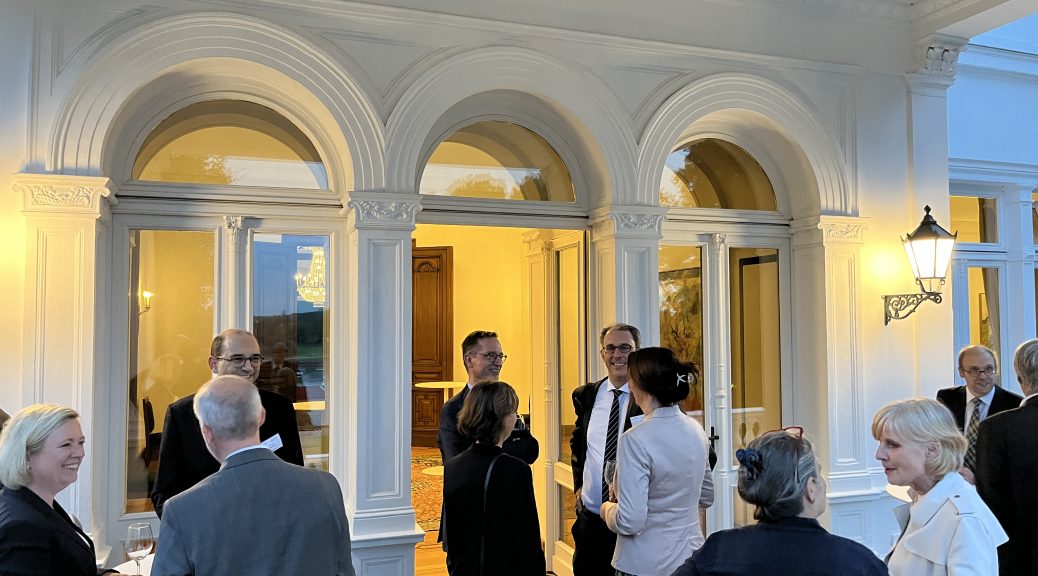
Conference Debriefing (38): Professors go Kartellamt
PDF-Version: Click here
Suggested Citation: Podszun, DKartJ 2023, 76-81
What place does economics have in competition law – and especially in abuse of dominance cases? When this question is discussed in Germany, good entertainment is guaranteed. The Bundeskartellamt, the Federal Cartel Office, is not exactly notorious globally for its more economic approach. It invited the German-speaking antitrust world to the debate. The whole antitrust world? No, lawyers from law firms and companies were left out. But Rupprecht Podszun was there – and reports.
Name of the event: Working Group on Competition Law of the Federal Cartel Office – as this name might raise questions (the Office needs a working group to deal with competition law?) the conference is informally known as the “Professorentagung” – the Professors’ Gathering. In German, the name that unmistakably dates back to times when there were no female competition law professors. Fortunately, that has changed.
Topic: “Guidelines on Article 102 TFEU – New benchmarks for abuse control” (The Office’s working paper on this is available here).
Place & time: House of the Protestant Church, Bonn, 28 September 2023
Host: Prof. Dr Konrad Ost, Vice President of the Bundeskartellamt, with Silke Hossenfelder, Head of the Policy Department.
Audience: The first seat in the audience is occupied by Wolfgang Kirchhoff, who is not only Chairman of the Cartel Senate of the German Federal Supreme Court (Bundesgerichtshof), but who is also the President of the Association of European Competition Law Judges. On the cheaper seats, the competition community is spread out in a colourful mix – I sat, for example, between the Viennese professor Viktoria Robertson and my Düsseldorf economist colleague Paul Heidhues. We also saw inter alia: Roger Zäch, the grand seigneur of Swiss antitrust law, Kirchhoff deputy Stefanie Roloff, Tabea Bauermeister, who has a junior professorship “in civil law and the law of the algorithm-based economy” in Regensburg, ex-Director General Johannes Laitenberger (now a judge at the ECJ), Thomas Gaeckle from the German Ministry for Economics, Marc Bataille, the new secretary general of the German Monopolies Commission, and of course all kinds of antitrust office celebrities, from Annette Bangard to Felix Engelsing to Anne Bußmann.
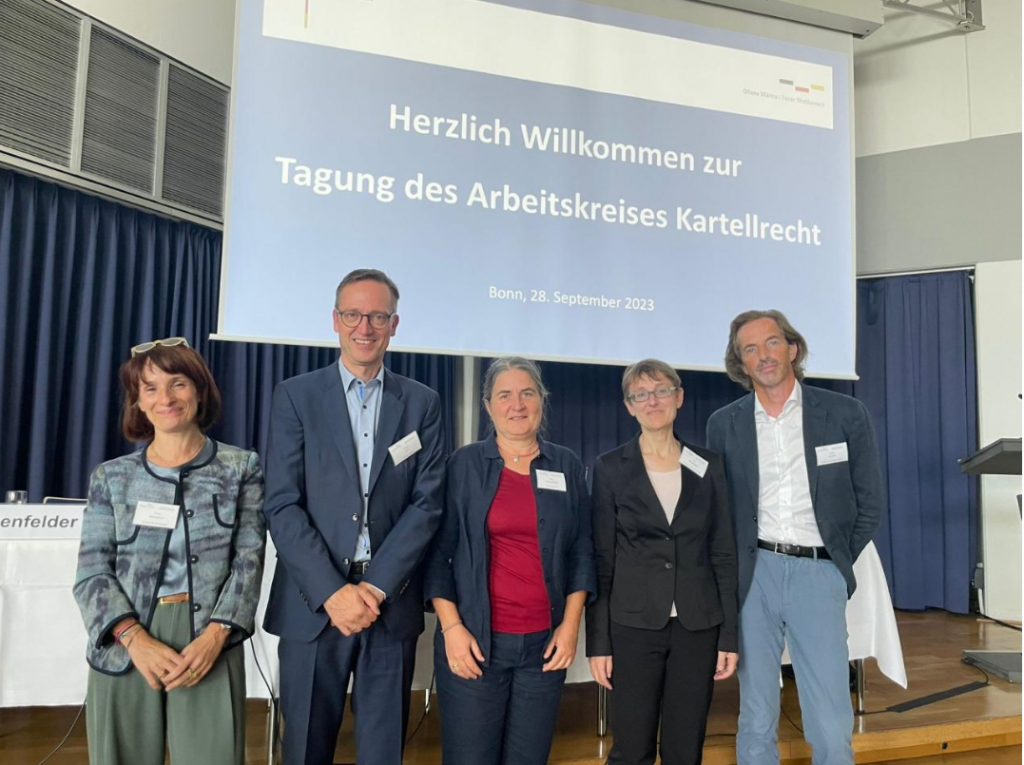
The meeting was held in the Protestant Church House? I seem to remember that the locations used to be more spectacular!
The church venue was a good fit, because the question of how much economics we need in competition law is of course a question of faith.
If I look at it theologically, Bonn was the seat of the counter-popes after the Great Schism around the priorities communication on Article 102 TFEU anno domini 2009, wasn’t it?
We met in the House of the Protestant Church, where a certain plurality of opinions is certainly desirable. Synodal President Konrad Ost began his introduction with a reference to the USA, where the Reformation is underway. The new US Draft Merger Guidelines are in any case “absolutely revolutionary” (according to Ost), and the New Lutherans Brandeisians are being mercilessly criticised by the Counter-Reformation.
Merger guidelines are merger control. Didn’t you want to talk about abuse guidelines?
Correct. But the trend is clear: worldwide, the pendulum is swinging back towards more enforcement and less case-by-case economics. I’ll come back to the USA, because Andreas Mundt, the President of the Federal Cartel Office, has been away travelling…
…and since his famous Chiemsee holiday when he found out about price parity clauses in hotel platforms we know what such a trip can mean!
Exactly, but first to the guidelines on Article 102 TFEU. The Bundeskartellamt had invited Linsey McCallum, who had recently been a guest at our doctoral seminar in Düsseldorf. She reported on the plans in Brussels. The European Commission’s goal is to adopt guidelines on exclusionary conduct under Article 102 TFEU in 2025. A first attempt, we remember, failed at the beginning of this millennium, not least due to strong resistance from Germany.
Yes, the German professors had complained at the time that legal certainty was being sacrificed!
Oh, and weren’t they right? The Commission had to scale down its planned guidelines and instead published a paper in 2009 in which it described its priorities in taking up cases – in reality, however, they were guidelines in disguise, as Luc Peeperkorn, one of the co-authors, has now clearly formulated in a statement. When, in the Intel case, it was thought that the ideas from the Priority paper could be put into case practice, a martyrdom began from which the Commission has not recovered to this day.
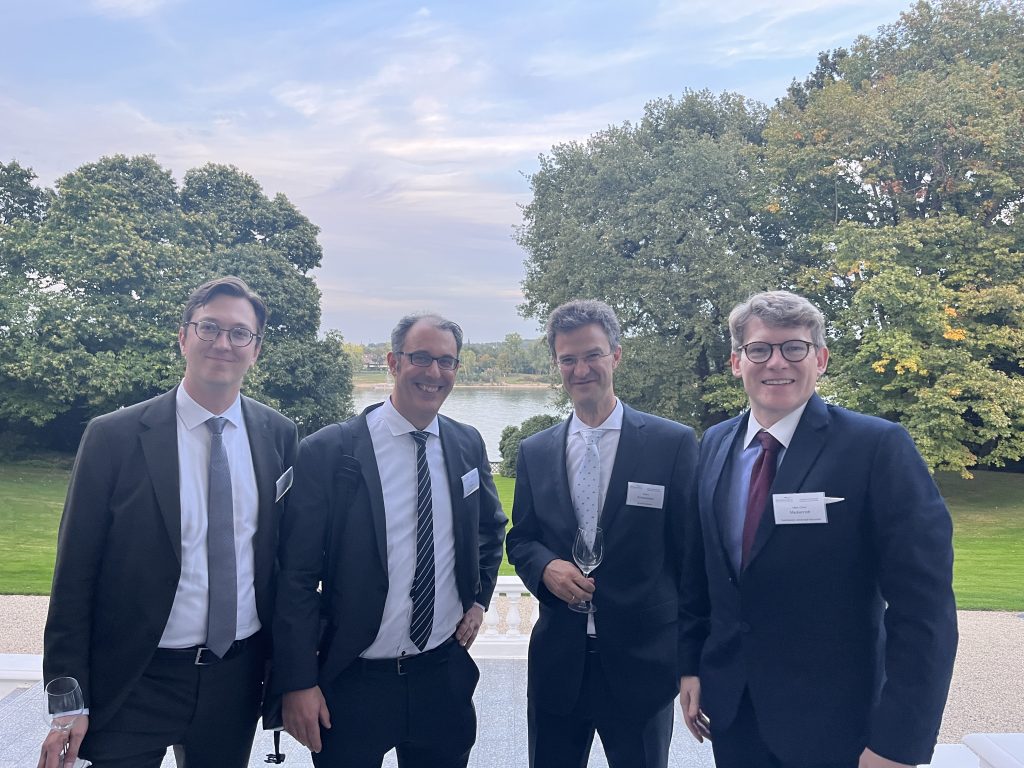
Now you’re exaggerating!
No, no, no, Intel has long been recognised as a fall from grace. The Commission had a rather good case, and managed to screw it up really neatly. In 2000 there were the first complaints against Intel, in 2009 the decision was handed down, and to this day the courts have not given a final ruling. A 23-year run of this case together with its twists and turns, that is the failure of antitrust law. Case practice since then has wandered about like Paul’s ship until it reached Malta (Acts 27). Heike Schweitzer from the HU Berlin had brought impressive statistics on how few cases the Commission actually handles in the area of abuse, how detailed they have become and how long it now takes.
It sounds like it has become very uncomfortable for the Commission representative?
The problem has long been recognised in Brussels. Linsey McCallum, for example, said that something like the as-efficient-competitor test in Intel would no longer be done. She even admitted that the Policy Brief, the kick-off letter for the planned new regulation, had caused confusion. She declared that they aim for a “workable approach”, possibly with a “sliding scale” of criteria and the naming of “naked restrictions” that are always forbidden without proving effects. Yet, after she had spoken, , a Babylonian confusion of language broke out.
This Bible stuff today… I need to sort it out: Babylonian confusion of tongues is not the one about speaking in all kinds of tongues at Pentecost, is it?
No, the Pentecostal miracle is still to come for antitrust law, and perhaps Heike Schweitzer has lit a candle for it. But first let me explain the language confusion of the day. Linsey McCallum said that one thing is unshakably certain: “Consumer welfare remains the objective of competition policy”.
Now that’s a clear message.
Yes, until someone questions what “consumer welfare” actually means. Apart from the fact that the terms “remains”, “objective” and “competition policy” are also open to interpretation. In my version of the TFEU, there is nothing in Article 102 about consumer welfare as an objective. Article 3 TEU contains all possible objectives pursued by the EU. And in the ECJ’s SEN decision there is a lot in it, but according to my reading there is no clear definition of the Consumer Welfare Standard. Jörg-Philipp Terhechte of Leuphana University vehemently pointed out that it was naïve to pursue abuses of dominance without an eye for the acute threat to democracy, and that this had certainly been an issue when the European competition order was created. However, I have the impression that this way of thinking is still considered a heretical extreme position. In any case, it was repeatedly suggested in various contributions that the other major crisis of the planet really does not fall within the remit of antitrust law.
So, you guys think it is your responsibility that the consumer pays two cents less in the supermarket, but it is extreme to question whether the consumer economy is not bringing the earth to the abyss?
Nanana, you’re not going to stick yourself in the street in front of the Federal Cartel Office, are you? In Bonn’s Kaiser-Friedrich-Strasse, that’s pointless anyway because of construction work. But to give you some more fodder: Birgit Krueger presented the recent Lufthansa/Condor case for the office. The Bundeskartellamt argues that Lufthansa should not cancel feeder flights within Germany so that people going on holidays can continue to fly comfortably with Condor from Hamburg via Frankfurt to the Caribbean.
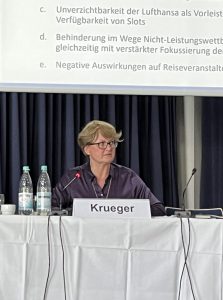
Couldn’t they take the train in a more environmentally friendly way? Haha, just kidding, of course.
I should not be explaining jokes, but for those fortunate enough not to have tried to travel in Germany with trains. DO NOT EVEN TRY TO. By the way, the railway services were also a topic. Birgit Krueger also dealt with the exciting mobility platform case in her decision department. Deutsche Bahn, the German government-owned railway incumbent, does not maka data available to start-ups and competitors while it passes them on to Google.
Doesn’t sound very fair.
The office has forbidden it, now they are arguing in court, as they did with Lufthansa, which – according to Krueger – ties up resources for a long time. Apart from the question of whether this is an abuse or not, I find it remarkable that a state-owned company like Deutsche Bahn (head of the supervisory board is Werner Gatzer, state secretary in the Federal Ministry of Finance) can involve a federal authority in an exhausting legal dispute before the Düsseldorf Higher Regional Court. Actually, my public law colleagues would be more competent to look at such a case than the cartel senates.
Back to topic, please! Was there anyone in support of the more economic approach?
This role fell to economist Roman Inderst (Frankfurt University). He was supposed to sing the gospel of economics on the podium. And he did. After Konrad Ost’s introductory talk “the tide is turning”, after Linsey McCallum’s admission that the European Commission has more or less failed with the more economic approach, after Heike Schweitzer’s impressive criticism of cases like Intel, the intonation was somewhat surprising: Inderst seemed completely unimpressed from the criticism. He asserted that the Consumer Welfare Standard is the one and only. His plea had many good and correct points, but I missed a bit of reflection on the experiences of the last 20 years, which even when read sympathetically tend to cause mixed feelings.
And did he get away with it?
There was a wonderful skirmish! But let me first say briefly what Inderst is about: He says that the Consumer Welfare Standard is the only programme that provides clear, consistent metrics and thus allows for predictable results. He wants an approach to abuse control that is predictable – and that is what this standard does. The only problem is that what exactly this standard is (and how dependent it is on all kinds of assumptions) is highly controversial. McCallum, for example, wants to define consumer welfare “broadly”. Consumer welfare would include, for example, price, quality, innovation and choice. It is questionable whether economists still have clear metrics for this. Even Georg Götz (University of Gießen), known as a strong-minded and steadfast competition economist at conferences, appeared defensive and quoted from Massimo Motta’s book to be on the safe side, which he described as “the bible” (in keeping with the conference venue). Maik Wolf (University of Erfurt) pointed out that first of all the consumer model and forecast period had to be clarified. Economist Oliver Budzinski (TU Ilmenau) asked his colleague Inderst about trade-offs; this problem also seems unsolved. If one has to examine this in individual cases, as the effects-based approach suggests, predictability is over. That is why McCallum does not want to quantify consumer harm in individual cases. For many economists, however, this is the crux of the matter when using economics.
Now tell the skirmish!
Inderst said, to make his metrics point: “I don’t want judges to rely on their gut feelings!” This polemic was countered by Konrad Ost, who said: Well, it would be nice if we knew what was going on after reading economic expert opinions. Then Wolfgang Kirchhoff stood up and made a firm plea against a complete case-by-case analysis and in favour of some presumptions. He said that this was necessary because in cases with an amount in dispute of EUR 80,000, one could not first obtain economic expert opinions that cost EUR 250,000. Inderst: The problem is not the expert opinions, but that the judges do not read the expert opinions correctly! Now Ulrich Egger, Chairman of the 6th Cartel Senate at the Düsseldorf Higher Regional Court, stood up and with his sonorous bass he said something like “Intel shows that it can’t go on like this”, but it sounded like “Now that’s enough”.
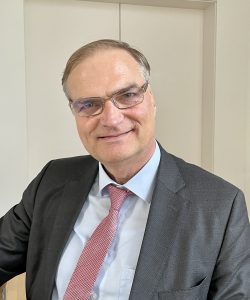
Is there no way out?
Inderst himself, for example, suggested that expert reports should only be three pages long: Assumptions, Concept, Result. I myself would work on procedural law and recognise that decisions are always only approximations of what an omniscient Judge Hercules would decide. I am encouraged in this by the fact that the agency representatives seem to suffer greatly from the procedure. McCallum and Krueger described how they are overwhelmed with data material, are attacked by ever larger numbers of lawyers and struggle with formalities. This is where things should perhaps be tidied up, also with a view to the recusals that have been asked for in cases such as Lufthansa/Condor or the unfortunate 50+1 proceedings. Just so that it is clear: I don’t mean a one-sided empowerment of the agencies, but a focus on smart and fair proceedings.
You also mentioned that Heike Schweitzer might point the way to the promised land?
She pleaded for a “principled approach”. We should move away from the concept of case groups and instead establish principles. The principles should make it clear when only an abbreviated effects analysis is required (if at all). She had three principles with her that may really serve as a good basis for further discussion.
Let’s be honest: Do we even need guidelines for the few cases of abuse in the EU?
That’s a fair question, not least because of ever changing economic phenomena and theories. For instance, the ideas from the 2005 more economic approach partly failed because they did give guidance on the platform economy, which required our attention after in the years that followed. I was therefore pleased to hear McCallum talk about making the application “future-proof”. However, as Paul Heidhues rightly explained, this would require building in feedback loops and creating a learning system. Heidhues also said: “We can’t avoid doing some kind of effects analysis”.
And now?
Tristan Rohner had already explained the great misunderstanding to me in his dissertation on the prohibition of abuse: economists do not understand what lawyers do – and vice versa. The misunderstanding became clear once again in the afternoon when, after potato and pumpkin soup, two of the wittiest and shrewdest professors came to the podium, economist Martin Peitz (University of Mannheim) and lawyer Florian Wagner-von Papp (Helmut Schmidt University Hamburg). Peitz announced that self-preference tests were in development that could become part of the antitrust authorities’ toolbox. It is just a pity that the Google Shopping decision, for which the toolkit would have been needed, was made in 2017. Thus, the instruments are at best relevant for Article 6(5) of the DMA. But the DMA no longer provides for an effects analysis in individual cases.
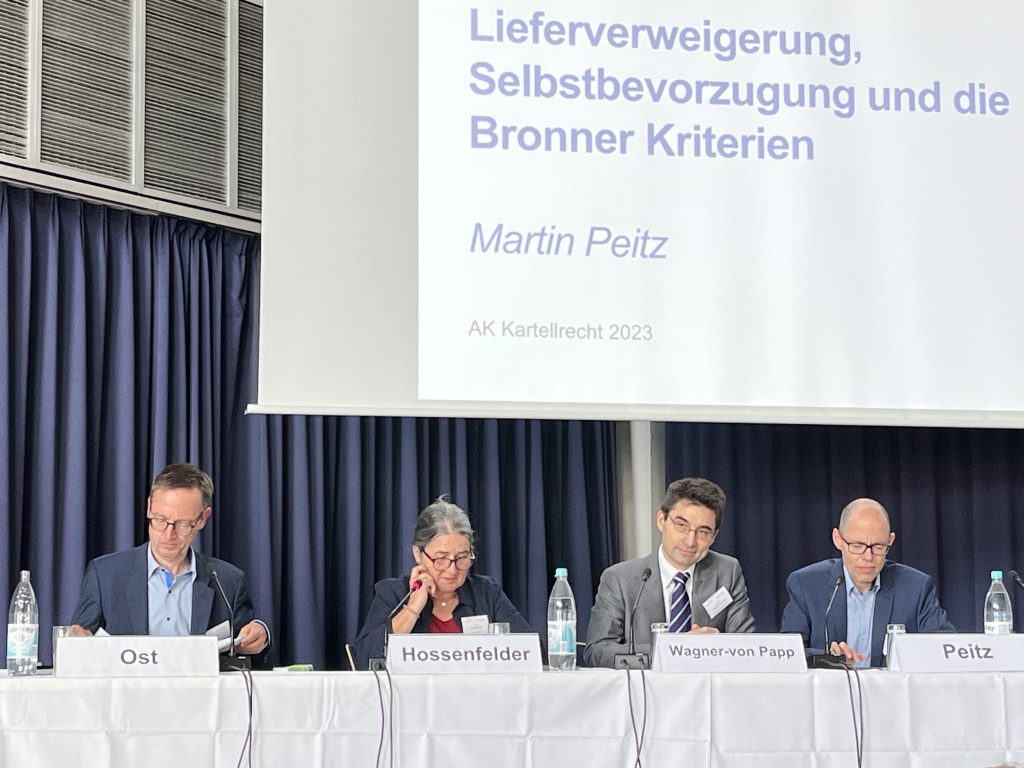
The prohibition of abuse once again set the pace for regulation – this time the DMA.
Wagner-von Papp said the same thing. Perhaps it is not a bad thing that anti-trust law cannot solve all problems – if regulation were not even more susceptible to misguided interventions and static determinations. Wagner-von Papp’s 33 theses, which he had nailed to Power Point slides in the House of the Church, were summed up by the beautiful quote from Carveth Read: “It is better to be vaguely right than exactly wrong”.
I realise that you have been very entertained by all this, but what are the officials in Bonn going to make of this discussion with the academics now?
This year it fell to Birgit Krueger to give the report from case practice. Three things became apparent: First, there is a lot of implicit economics in cases like Lufthansa/Condor or DB Mobilitätsplattform. Competition law is effectively about economic theory. Secondly, however, not much in the two recent German decisions strikes the reader as part of a more advanced economic approach, you know, econometrics, quantification of consumer harm, regression analysis or AEC test. The reasoning is more qualitative in nature. Thirdly, it fits into the picture that Birgit Krueger said: “We have quite a good story in both cases”.
Wait a minute, law enforcement as storytelling?
I’m not sure about that either. But I assume that this kind of storytelling is underpinned by facts. The point is to make the story plausible for the courts. Anyone who has ever corrected a law exam knows that good exams are characterised by the fact that a common thread is recognisable, that a good story is told…
I don’t know. Now tell me about the trip Andreas Mundt took!
Mundt always comes to the end of the event, when the reception is held in the Villa Hammerschmidt which is the Bonn residence of the German Federal President.
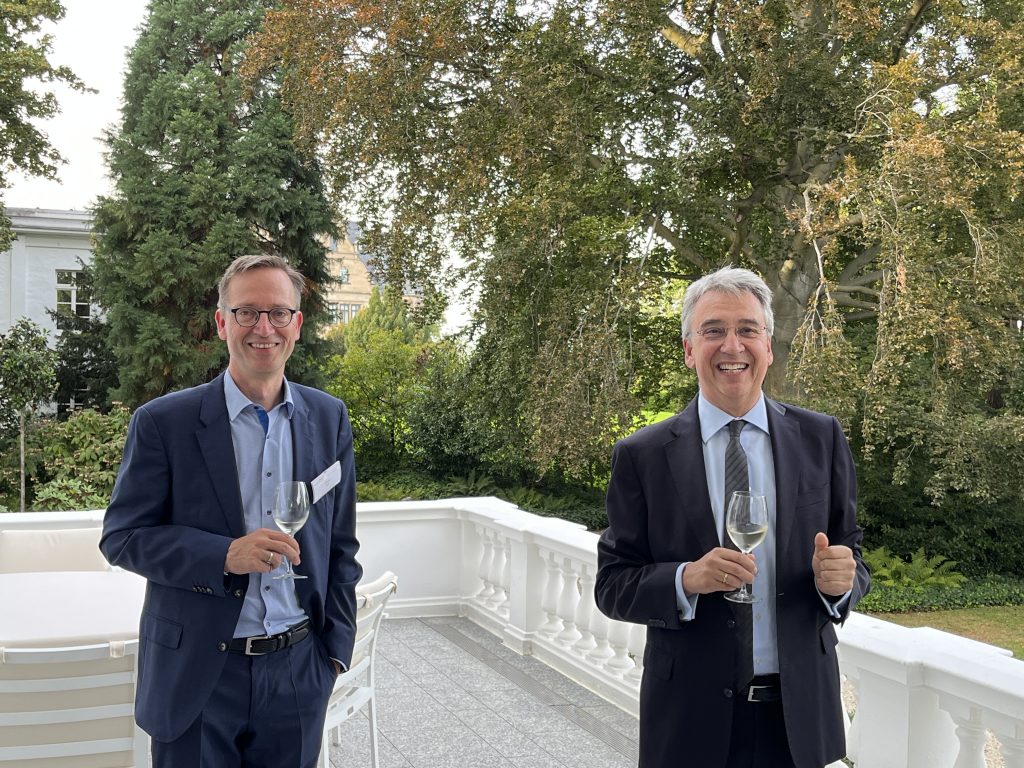
Oh, Mr. Mundt invites you to the Villa Hammerschmidt?
He emphasised in his little welcoming speech that he is not residing there. When a somewhat cheeky professor remarked that things could still get better, Mundt faltered briefly. That was not a crystal-clear denial of his ambitions for another Presidency!
German President Mundt, hihi….
You read it first, here! President Mundt had just returned from the Fordham Conference in the USA, and it was obvious that he was secretly pleased that terms like “structural”, “presumption” and “underenforcement” were doing the rounds in the USA. At the Ascola conference this year, Herbert Hovenkamp also spoke out in favour of abuse provisions as in EU law. That is a little earthquake for US law. From Mundt’s point of view, the Germans have stayed the course. The heretics are the others. But he also said, and this brings us back to storytelling, that he is concerned about how certain narratives are being spread in the US. Big Tech, for example, funds commercials that creepily warn of destroying the paradise of digital ecosystems. “That’s what judges in the US see on a continuous loop,” Mundt said. Phew. But then… The Rhine flowed picturesquely past the old Bonn government quarter in the setting sun, economists and lawyers sipped orange nectar in cosy harmony, and the economic textbook Gabler’s Wirtschaftslexikon (in the old 2nd edition) slumbered on the bookshelf in the Villa next to Karl Rahner’s foundational book on faith “Grundkurs des Glaubens”. Take me down to the paradise city!
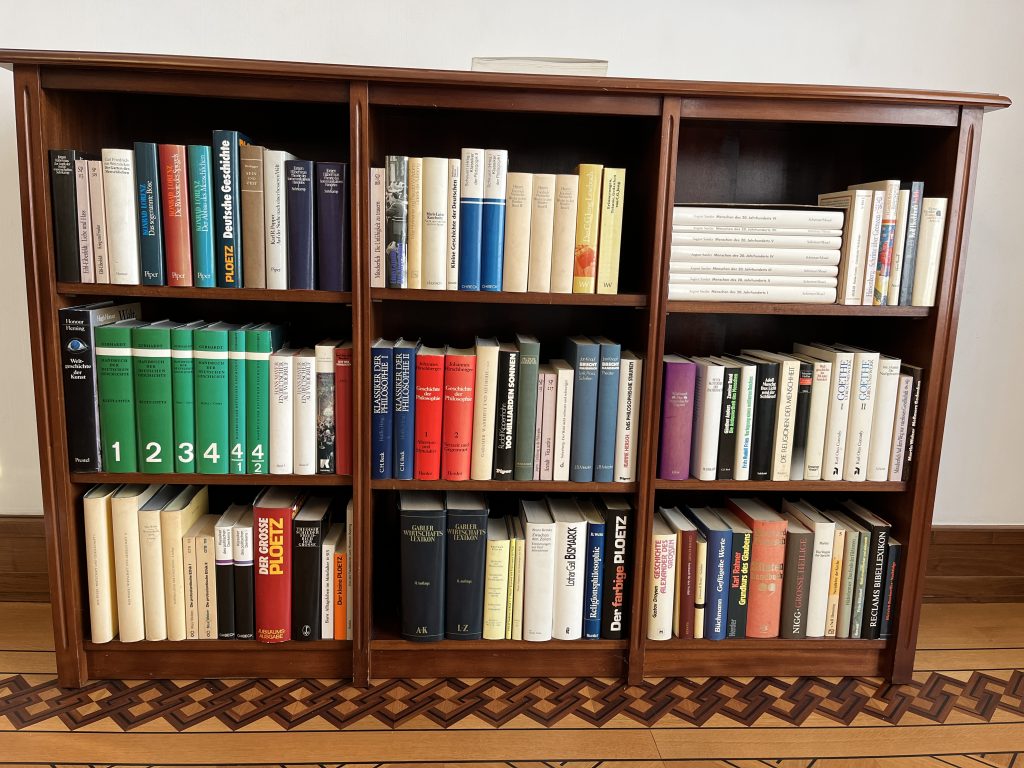
Prof. Dr Rupprecht Podszun is one of the directors of the Institute for Competition Law at Heinrich Heine University in Düsseldorf. Together with Dr Tristan Rohner, he has written a statement on the European Commission’s Call for Evidence (available here on SSRN). An editorial by him on the topic appeared in Concurrences 3/2023.
Transparency Notice: We slightly amended the English version after publication since we had erroneously posted an earlier draft.